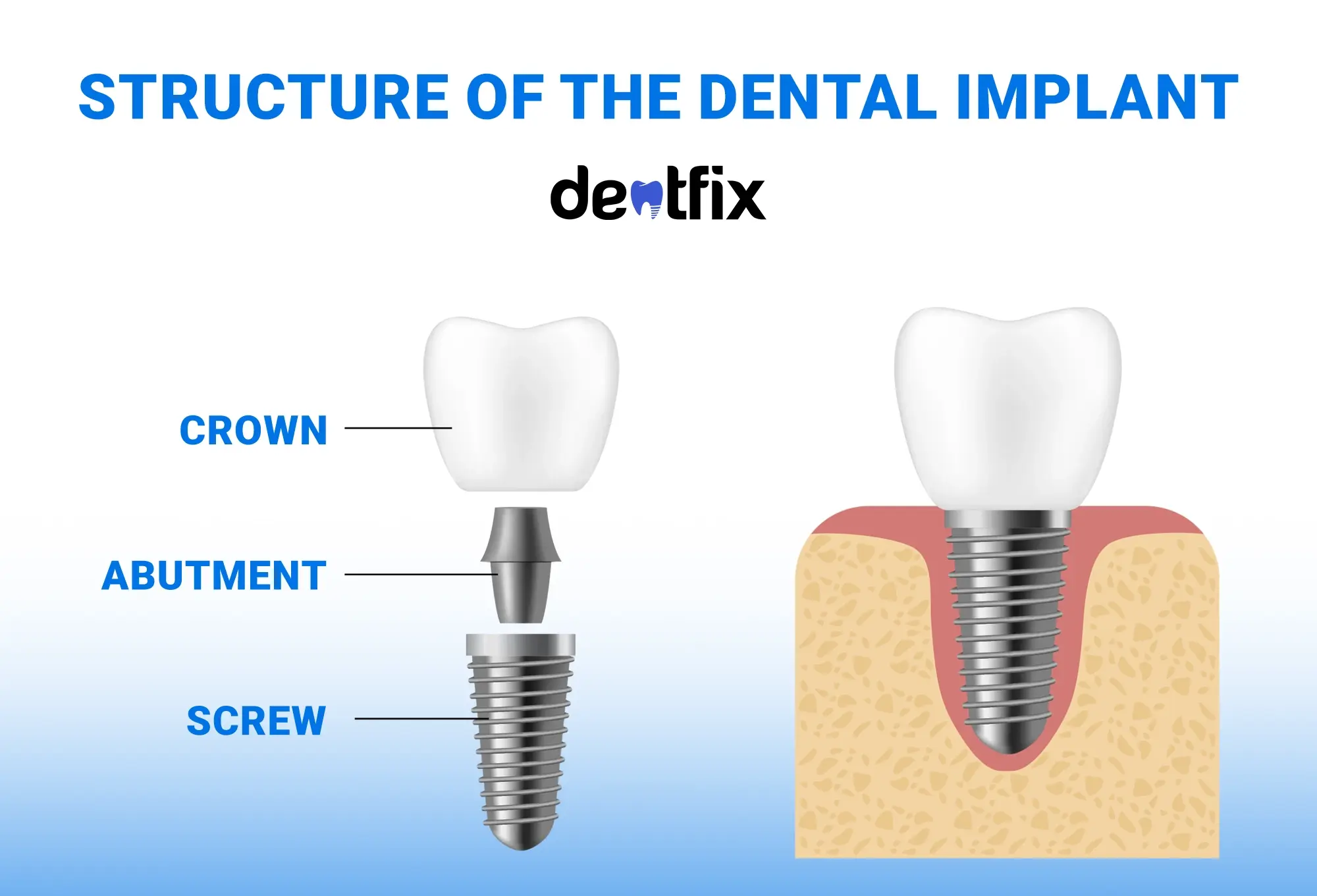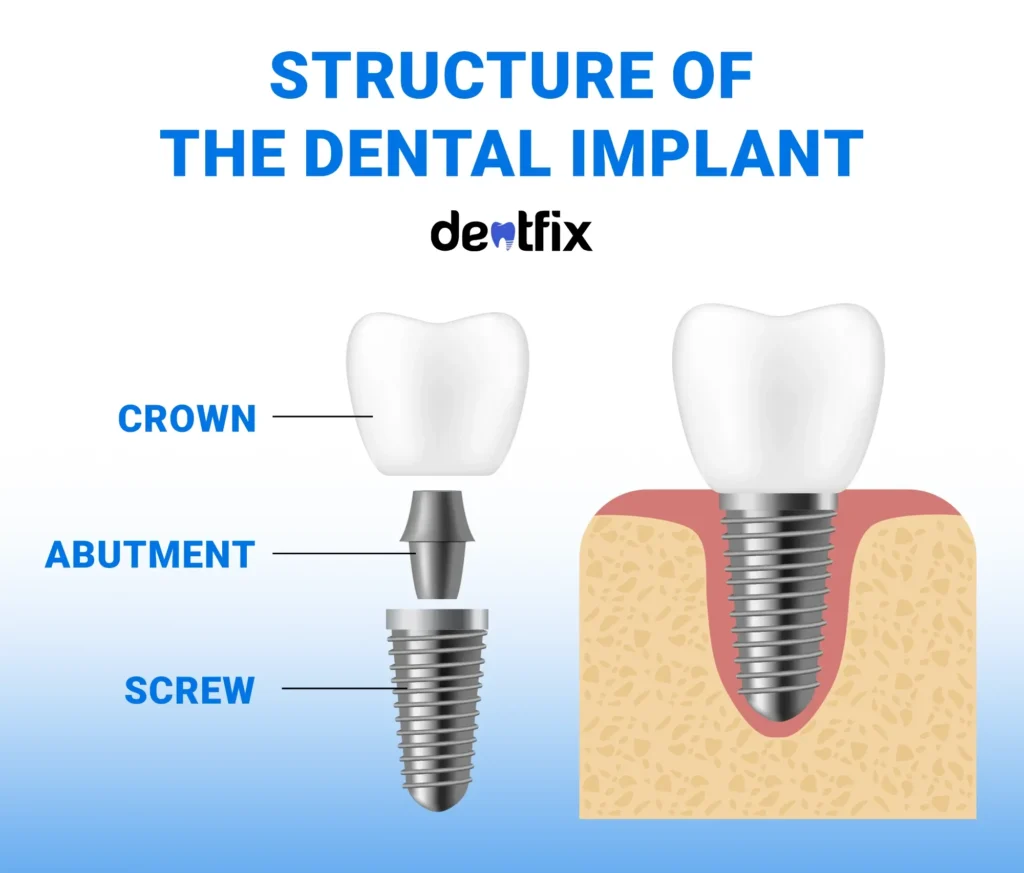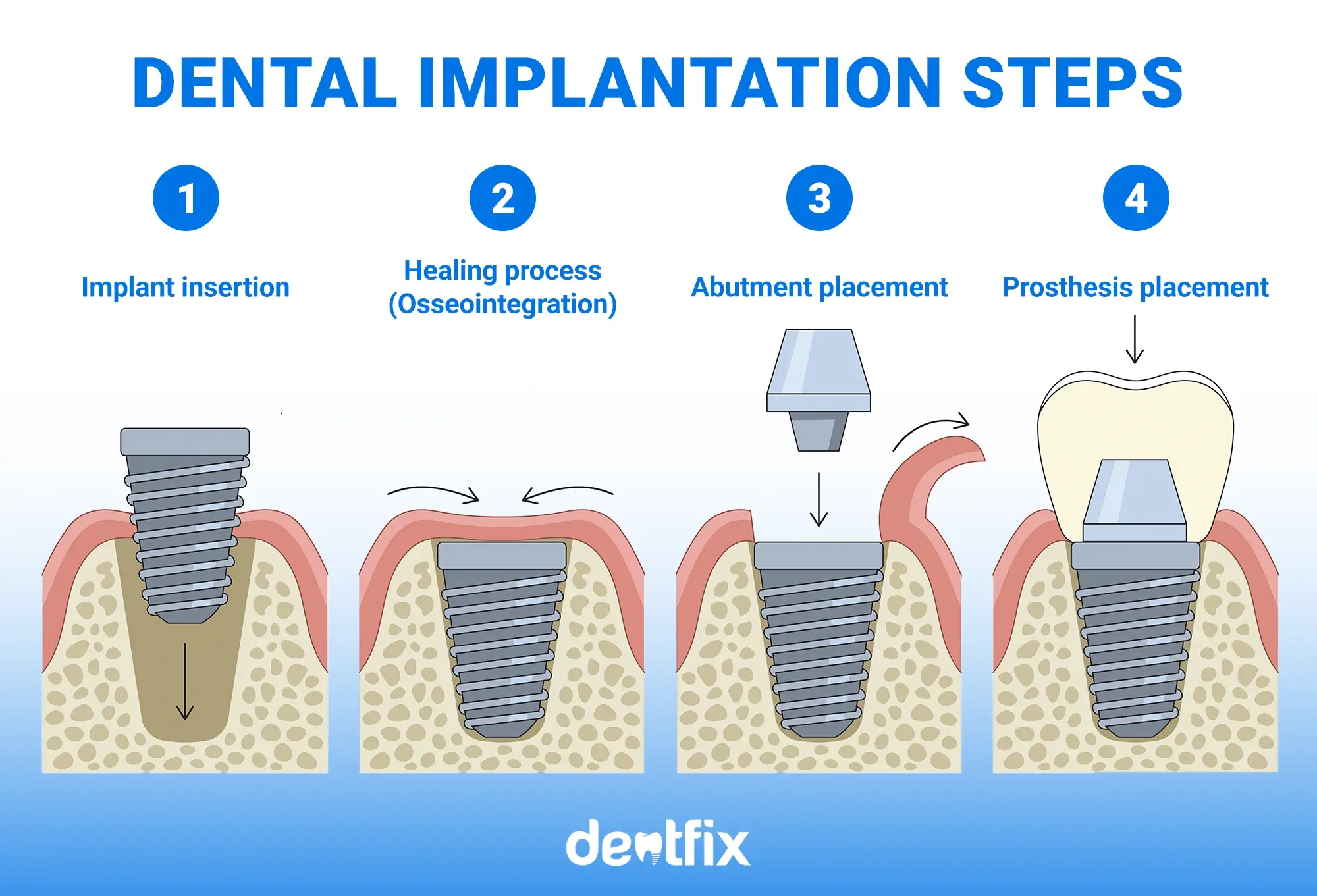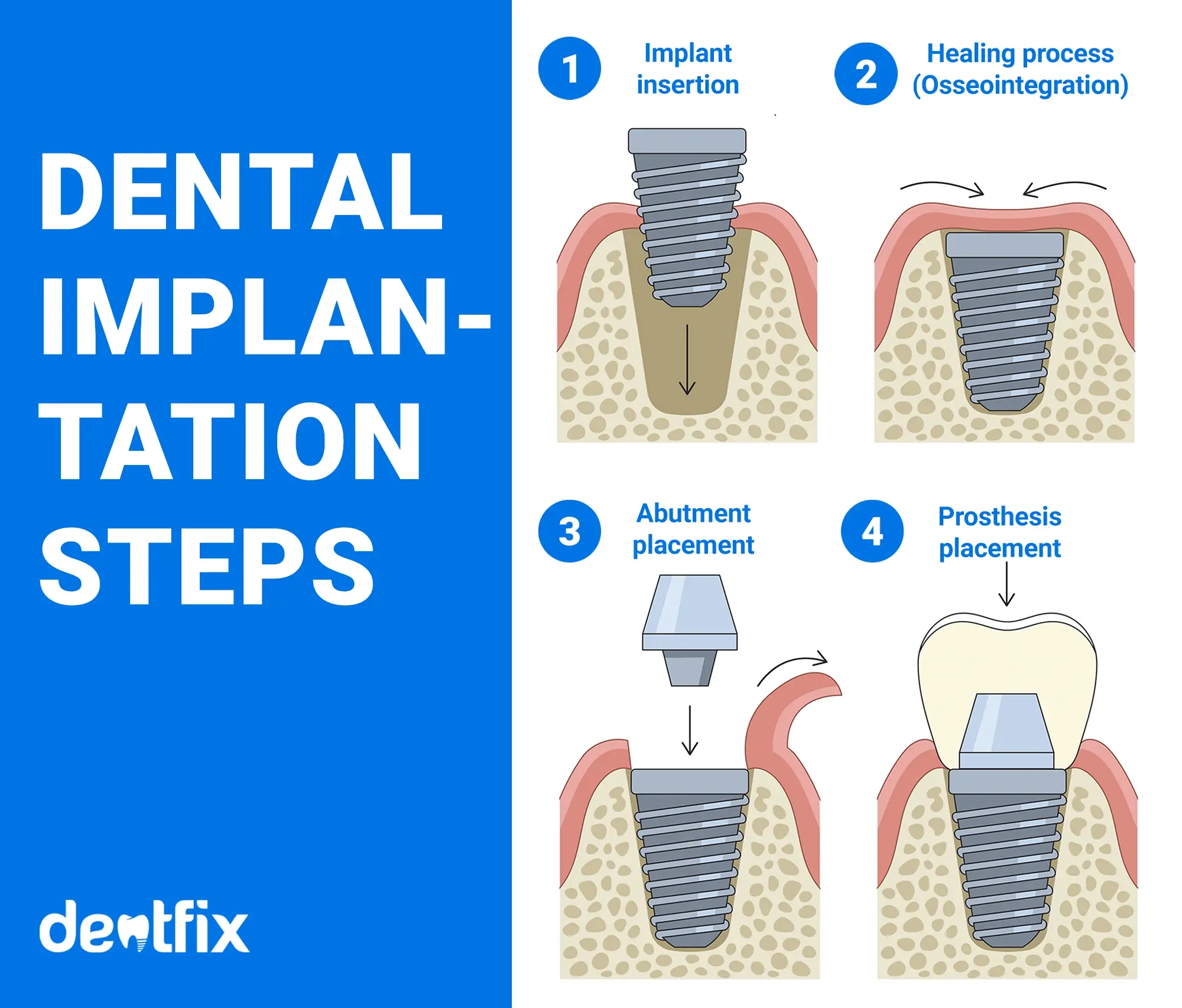Dental implants provide you with a solution for your missing teeth. It gives you brand new teeth for missing teeth gaps and it does that with a design just like natural teeth. Implants contain artificial tooth roots made from durable materials such as titanium and zirconium. It requires a surgical procedure, and in the end, you have natural and healthier teeth.
Here’s a recap of the article:
- Implants are artificial tooth roots.
- The implant fuses with the bone in a process called osseointegration.
- If there is insufficient bone density to support the implant, the patient will need a bone graft.
- Proper care is essential for ensuring the success of implants.
- The lifespan of implants is 10 to 30 years.
- Implants consist of three parts: fixture, abutment, and crown
- Implants are designed to be permanent.
What Are Dental Implants?
Implants can be called screws and act as artificial teeth. Implants are artificial tooth roots used to treat missing teeth. A fixed or removable prosthesis is attached to the implants.
These implants are placed in the jawbone and support the prosthesis. They are usually made of titanium and zirconium.
Also, ceramic implants exist. They are hypoallergenic and inflammation-free. If you are allergic to titanium, ceramic implants come as an alternative.


What Are the Types of Dental Implants?
Different types of dental implants exist for different needs. The three main types differ in their production methods and the procedures they employ. These are:
- Endosteal Implants: The most common type includes screw-shaped implants placed into the jawbone.
- Subperiosteal Implants: Positioned under the gum but above the jawbone, these are used when there is not enough bone for an endosteal implant.
- Zygomatic Implants: Placed in the cheekbone (zygomatic bone) instead of the jawbone, these are used in cases of severe bone loss.
- Full Mouth Implants: Multiple implants are placed in the upper and/or lower jaw to support a full set of prosthetic teeth, used when most or all natural teeth are missing.
What Are the Pros and Cons of Dental Implants?
Several benefits of dental implants exist. These benefits come with cons. Even though a dental implant is necessary when needed, it still has disadvantages. Let’s look at them together:
|
PROS
|
CONS
|
|---|---|
|
Natural Appearance
|
Cost
|
|
Improved Functionality
|
Surgical Procedure
|
|
Durability
|
Time Commitment
|
|
Easy Maintenance
|
Bone Grafting Requirement (might be)
|
|
Bone Preservation
|
Potential Failure
|
How Do Dental Implants Work?
The dental implant works by integrating the titanium implant with the surrounding bone tissue. The implant is a surgical procedure, so it can take several months for the implant to fuse with the bone after it is placed in the jawbone.
After this integration, the abutment is attached to the fixture, and a custom-made crown is placed on top of it.
This procedure ensures that the implant remains fixed and secure, while also supporting chewing and speech functions.


When Is Bone Graft Needed?
You might need a bone grafting procedure if you have insufficient density or volume to support a dental implant. Bone loss happens when there is periodontal disease, the patient has tooth extraction or tooth loss. In such cases, the patient may need a bone grafting procedure.
What Is the Post Operative Care After Dental Implants?
Post-operative care after dental implants is crucial for the success of dental implants. So easy to do regularly in three ways:
- Maintaining an oral hygiene routine
- Avoiding hard, sticky, or chewy foods
- Follow-Up Visits
How Much Do Dental Implants Cost?
The cost of dental implants can vary based on factors such as location, the complexity of the procedure, and the materials used. Also, additional procedures like bone grafting or sinus lift may be necessary, which can incur extra charges.
|
COUNTRY
|
PRICE (PER IMPLANT)
|
|---|---|
|
Turkey
|
€900 - €1,800
|
|
USA
|
€2,800 - €4,200
|
|
UK
|
€2,300 - €3,200
|
|
Canada
|
€2,300 - €3,800
|
|
Germany
|
€2,300 - €3,200
|
|
Australia
|
€2,800 - €3,800
|
|
Spain
|
€1,400 - €2,300
|
How Do You Know If A Dental Implant Failed?
Signs of dental implant failure can help you easily understand if your implants are failing or not. You should pay attention to your implants with oral hygiene and follow-up visits. Taking good care of your implants with proper cleaning and regular check-ups helps you notice any problems early. Let’s see the signs:
- If you feel ongoing discomfort and persistent pain around the implant site;
- If you have symptoms such as swelling, redness, or discharge;
- If your implant or crown feels loose or unstable;
- If you have issues with chewing or speaking,
It means that your implants may be failing.
Can A Dental Implant Be Fixed If It Fails?
Yes, a dental implant can be fixed. If your dental implant fails, your dentist will first evaluate the cause of the failure. Then, we will create a suitable treatment plan for your needs. This suitable treatment plan may involve replacing the failed implant and addressing any underlying issues.
How Long Do Dental Implants Last?
The average lifespan of a dental implant is 10 to 30 years. This is possible with regular check-ups, good oral hygiene, and avoiding habits that may be risky for your teeth. You can have a dental implant for many years with this kind of proper care.
Is There an Alternative to a Dental Implant?
Yes, there are alternatives to dental implants. You may be looking for other options such as less invasive, and less expensive, or maybe you want another treatment because of the cons that discomforted you. Here are the alternatives for you:
- Dental Bridges
- Mini Implants
- Dentures
- Resin-Bonded Bridge
- Dental Flipper
How Painful Are Dental Implants?
The dental implant procedure is performed under local anesthesia. So, you will feel minimal pain and maybe discomfort during the procedure.
Post-operative discomfort can also occur but it is manageable with prescribed pain medication. It tends to decrease within a few days. Most patients experience only mild discomfort and swelling after the surgery.
Can I Have Implants If I Have Gum Disease?
No, it is healthier to treat gum disease first; after that, you can have dental implants. Healthy gums and adequate bone density are essential for the success of the implants. Otherwise, dental implant failure is inevitable, no matter how perfectly the procedure is done. At Dentfix, your dentist will address any gum issues prior to implant placement.
Are Dental Implants Removable?
No, dental implants are not removable. The jawbone permanently integrates implants. This provides a stable foundation for the attached restoration and makes a natural replacement for a lost tooth.
Do My Dental Implants Look Fake?
No, your dental implants will not look fake in our clinic. We properly design and place implants, and the crowns are custom-made to match the color and shape of your existing teeth. We choose crown colors to match your natural shade, creating a seamless and natural look for your smile.
Are Full Mouth Dental Implants Better Than Individual Implants?
Full-mouth dental implants are generally needed when patients need multiple teeth replaced. Full mouth is a smile makeover that includes a comprehensive solution and provides transformation for teeth.
Choosing the better one depends on your needs. If you have multiple lost teeth, then you may need a full-mouth dental implant and it is better than single implants. But, if there is no need for multiple teeth, individual implants will be enough for you and it is better in that way.
Who Needs A Dental Implant?
Dental implants offer a permanent solution for missing teeth. This procedure may be suitable for individuals with different needs. Here’s a quick list of suitable patients for dental implants.
- Patient with missing teeth
- People with uncomfortable dentures
- People with poorly fitted bridges
- People who want to preserve jawbone
- People who want a long-term solution
However, sometimes dental implants may not be suitable for everyone. Some patients may need different kinds of treatment. Let’s see the candidates who are not suitable.
- Patients with severe bone loss
- Patients with uncontrolled medical conditions
- Patients with certain types of gum disease
References:
1-) Gupta R, Gupta N, Weber, DDS KK. Dental Implants. [Updated 2023 Aug 8]. In: StatPearls [Internet]. Treasure Island (FL): StatPearls Publishing; 2024 Jan-. https://www.ncbi.nlm.nih.gov/books/NBK470448/
2-) French D, Ofec R, Levin L. Long term clinical performance of 10 871 dental implants with up to 22 years of follow-up: A cohort study in 4247 patients. Clin Implant Dent Relat Res. 2021 Jun;23(3):289-297. doi: 10.1111/cid.12994. Epub 2021 Mar 25. PMID: 33768695; PMCID: PMC8359846. https://www.ncbi.nlm.nih.gov/pmc/articles/PMC8359846/
3-) Gupta R, Gupta N, Weber, DDS KK. Dental Implants. 2023 Aug 8. In: StatPearls [Internet]. Treasure Island (FL): StatPearls Publishing; 2024 Jan–. PMID: 29262027. https://pubmed.ncbi.nlm.nih.gov/29262027/
4-) Buser D, Sennerby L, De Bruyn H. Modern implant dentistry based on osseointegration: 50 years of progress, current trends and open questions. Periodontol 2000. 2017 Feb;73(1):7-21. doi: 10.1111/prd.12185. PMID: 28000280. https://pubmed.ncbi.nlm.nih.gov/28000280/
5-) O’Mahony A, Spencer P. Osseointegrated implant failures. J Ir Dent Assoc. 1999;45(2):44-51. PMID: 10686922. https://pubmed.ncbi.nlm.nih.gov/10686922/